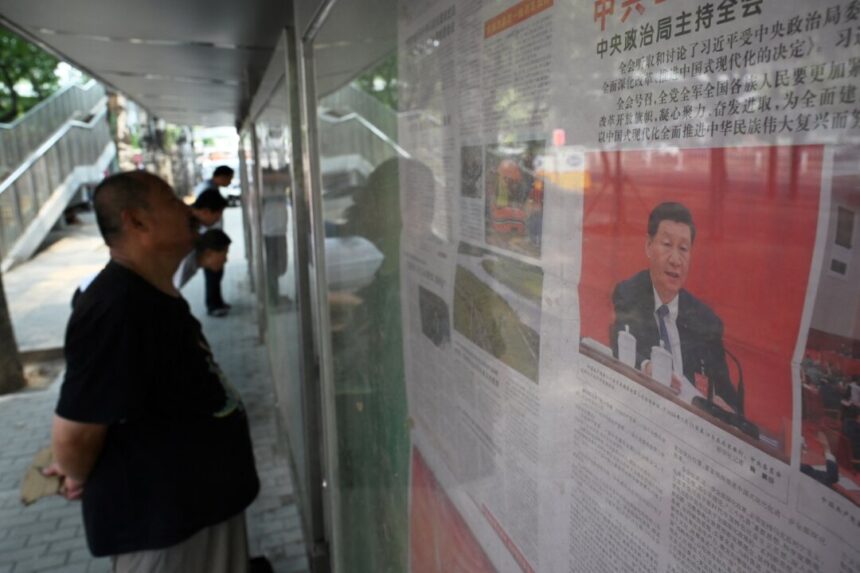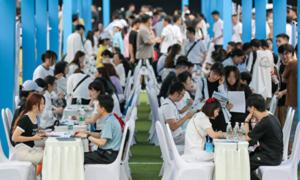Commentary
Chinese citizens have coined the term “garbage time in history” to describe the current state of China’s struggling economy. This phrase, borrowed from basketball, refers to the final moments of a game when the losing team has no chance of a comeback. The sentiment gained momentum following the conclusion of the Chinese Communist Party’s third plenary session, which failed to offer new solutions to the ongoing crisis.
When can we expect to see a turnaround and the dawn of a new era in China?
Guo Jun, president of The Epoch Times in Hong Kong, noted that the widespread use of “garbage time in history” indicates a belief among the people that any actions taken by the CCP will be ineffective in changing the current trajectory.
“Whether proactive or reactive, these actions are viewed as futile,” Ms. Guo explained. “Like a carriage plummeting off a cliff, it no longer matters what the coachman does. Once a political system reaches a critical point, even the efforts of supposed great leaders cannot alter its course—the CCP officials, however, refuse to accept this reality.”
CCP’s Greatest Concerns
Chinese dissident Du Wen highlighted that the CCP is driven solely by profit, devoid of ethics, and unconcerned with criticism or moral conscience. Despite this, he pointed out that the CCP harbors fears related to certain domestic and international issues.
Discussing domestic matters, Mr. Du emphasized that the CCP’s primary fear is social unrest and instability, particularly large-scale protests and regional turmoil. Managing and controlling these issues has become a top priority for the authorities to prevent scenarios like the 2019 Hong Kong anti-government movement and the White Paper Campaign incident in 2022.
Historically, retired elderly individuals, rural migrant workers, and peasants were the most likely groups to protest. However, Mr. Du pointed out that the CCP’s current focus is on safeguarding itself against discontent among educated young people, who are increasingly dissatisfied with the status quo in China.
“The CCP views this demographic as more threatening than the retired elderly, rural workers, and peasants,” he noted.
Additionally, the CCP is apprehensive about the economic crisis, as the economy is fundamental to its legitimacy. Mr. Du recalled how during Mao’s era, the CCP made concessions to the United States due to severe economic troubles that threatened its rule.
Furthermore, the CCP is uneasy about international isolation, particularly amid tensions with the United States and Western nations. Sanctions could impact China’s economic, technological, and military sectors, jeopardizing its development and global standing.
“The CCP’s primary concerns revolve around maintaining internal stability, economic growth, and avoiding international isolation and sanctions,” Mr. Du explained.
Ms. Guo highlighted that the CCP’s greatest fear is the loss of political power and control, prompting it to respond to crises by tightening its grip on society.
“Throughout its history, the CCP has relied on force and control,” she remarked. “This was true when they seized power and remains so today. Their approach during crises has always been to further tighten control. However, past successes can sometimes sow the seeds of future failures. At the third plenum, rather than decentralizing power, Beijing opted to consolidate its authority.”
Shi Shan, a China expert and senior editor at The Epoch Times, cautioned against falling for the CCP’s rhetoric of “comprehensive deepening of reform” following the third plenum.
“Before the conclusion of the third plenum, there was speculation from the international community, including investors and think tanks, that China might introduce new reform measures,” he said. “The CCP also labeled it as a comprehensive deepening of reforms. However, a closer look at the meeting’s communiqué reveals that the so-called reforms primarily focus on strengthening the party’s leadership and central authority.”
As for how long China’s “garbage time” will persist, Ms. Guo mused, “That is a question left to fate.”
Views expressed in this article are the author’s opinions and do not necessarily reflect those of The Epoch Times.
Could you please rewrite this sentence for me?
Source link







